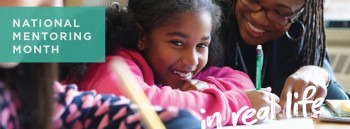January is National Mentoring Month: Celebrating Mentoring and the Positive Effect it can Have on Young Lives

“There is no such thing as other people’s children, we all have a responsibility.” --David Shapiro, CEO of MENTOR The National Mentoring Partnership
Aprill O. Turner, CFYJ Communications Director
More than 5 million children, or one in 14, in the U.S. have had a parent in a state or federal prison at some point in their lives, according to the Annie E. Casey Foundation, and children of color are much more likely to have a parent in prison. One in nine African-American children had a parent behind bars (2015). Since we all know that it takes a village to raise a child, we can all ask ourselves the question, what can I do to help?
January is National Mentoring Month (NMM) and allows us to focus on how we can all work together to increase the number of mentors to make sure young people in our communities have dependable people to look up to and follow in their footsteps. NMM celebrates mentoring and the positive effect it can have on young lives.
Children of incarcerated parents have special needs, and there’s no question that a consistent, nurturing relationship with a dependable adult is an essential developmental support for children. Organizations have been researching the benefits of formal mentoring programs for years, and there is a general consensus that mentoring works.
Evidence has shown that mentors can make a tangible difference in young people’s lives – a consistently caring and supportive adult – can significantly reduced a young person’s initiation of drug and alcohol use, improved school performance and attendance, and reduced incidences of violence. Given these realities, mentoring would seem to be a promising approach for responding to the challenges facing children with an incarcerated parent, as well as your young people that may be headed down a bad path.
Mentoring is a widely-used prevention and intervention strategy for supporting youth who are involved in the criminal justice system. Mentoring creates positive impact in young people's lives. Youth with mentors find more self-confidence, self esteem, and are able to create big goals for themselves. Additionally, studies show that behavior, attitudes, and relationships improve when a young person has a has a mentor. Research also suggests that mentors can be effective in reducing recidivism and promoting successful transitions out of juvenile justice systems (OJJDP).
The impact of incarceration wreaks havoc on families, communities, and young people lives. Please join in as we all do our part to mentor a young person that we know needs it.

